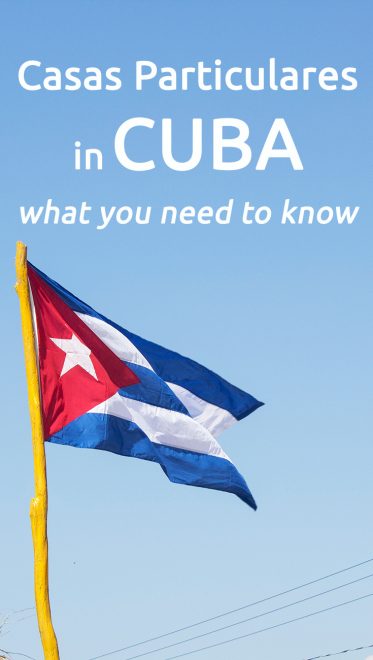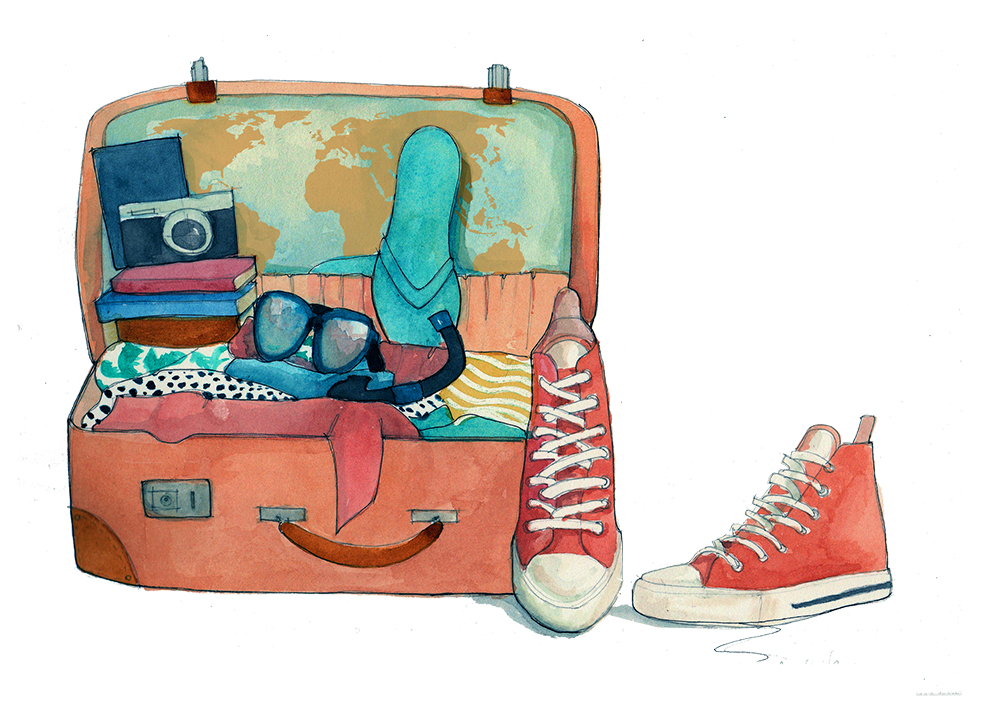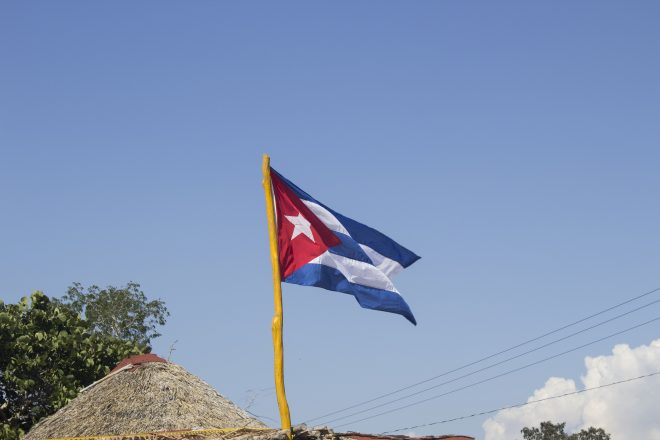
During our two-week trip to Cuba, we only stayed at Casas Particulares, not only because they were cheaper than hotels, but rather because it’s the best way to have an authentic experience in the country. It’s also a wonderful way to get to know the locals and interact with them, to get some valuable insider tips, and to have someone you can count on in case you need any assistance.
What are Casas Particulares? Translated to English it means ‘private homes’, it’s basically the concept of renting a room at a local’s home. In Cuba, you may or may not interact with the owner of the house during your stay, and it’s also possible to rent an entire house for you.
In total, we stayed in 6 different Casas, some we booked in advance, others were last minute. Some we liked more than others, though they were very similar in many aspects. For all of you planning to head to Cuba soon, I put together all the information I gathered from our personal experience and from what we heard from many travelers we met along our trip. We hope this post will help you to have an overview of what’s like to stay at a Casa Particular, how to book, prices, and details regarding food, rooms, hosts, tips to save, and more, so here we go:
All about staying at a Casa Particular in Cuba
There are thousands and thousands of Casas Particulares available across Cuba. The options are not only limited to the ones recommended on travel guides, nor to the ones you find online. Once you arrive in the country, you will notice the incredible amount of people renting out rooms in their homes. It is the most popular type of accommodation in the country.
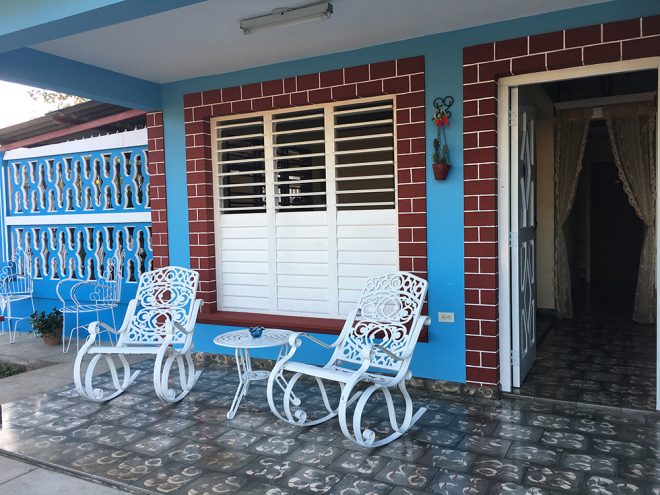
Price & Booking
Prices for a room or an entire place vary a lot, and mainly depends on the location (some cities are more expensive than others) and even on where you book it. So you have an idea, our price range was 25-45 CUC’s per night. Varadero and Havana were the most expensive locations from our itinerary.
Nowadays you can book a Casa Particular via several websites, like Casa Particular, My Casa Particular, Your Casa Particular, also on Airbnb. Some websites are cheaper than others, some offer more details, and others can be a bit more complicated to book than others. Sometimes you see that the Casa is still available but isn’t, so most of the time you have to get in touch with the owner to check availability.
Tip for saving: booking directly with the owner is always cheaper, though the only challenge is to get the direct contact of the Casa, nothing that a little research can’t help. One of our Casas was booked through Airbnb and it cost us 45 CUC’s a night, when we arrived there, we discovered that their normal price is 25 CUC’s!
Good to know: once you are in Cuba, even though you can still access the website and browse through it, you are not allowed to book any property via Airbnb, as the company is not permitted to ‘sell’ in the country’. So if you plan on booking via Airbnb last minute, forget it*, unless you are a computer geek and know how to change the settings of your computer connection to trick the local one into believing you’re not exactly connected in Cuba!
The rooms
In a room of a Casa Particular, having clean sheets and towels is the basic. Most also will have air conditioning (all Casas where we stayed had one) or at least a ventilator, some also go beyond and have a minibar. Keep in mind that not all beds will be comfortable, we had quite few uncomfortable mattresses along the way, one even with bed bugs. Also, know that Cuba is a very noisy country, and the buildings are old, with most of them having wooden windows that don’t close properly, hence, in the vast majority of accommodations, you will hear a lot of noise. Our rooms in Havana were the loudest!
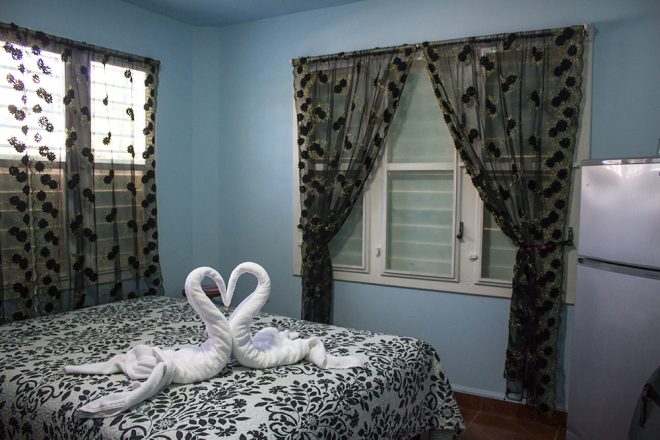
The bathrooms
Not all rooms have a private bathroom, so if you don’t want a shared one, make sure to check that before you book the room. Some websites clearly state if the bathroom is shared or private, some don’t, but even if they do, sometimes once you get to the house the owner might give you a different room. I recommend to clearly express your needs with the owner previous to your arrival to avoid any surprises.
Something very common: the showers have very low water pressure. In every single house we stayed at we encountered this problem. In one of them it took me ages to get my hair fully wet.
The food
Every Casa we stayed at offered breakfast, they normally ask you the previous night if you’d like to have breakfast so they can prepare it for you. They charge between 2-5CUCs per person. All the breakfasts we had were great, with fresh fruits and juices, eggs, bread, milk, coffee and much more. In one of the houses there was even Cheerios and Nesquik imported from the US, something that doesn’t even exist in Cuba. Some Casas also offer lunch and dinner, we stayed at a Casa that offered every meal, the owner was a great cook (she charged about 10CUC’s for each meal).
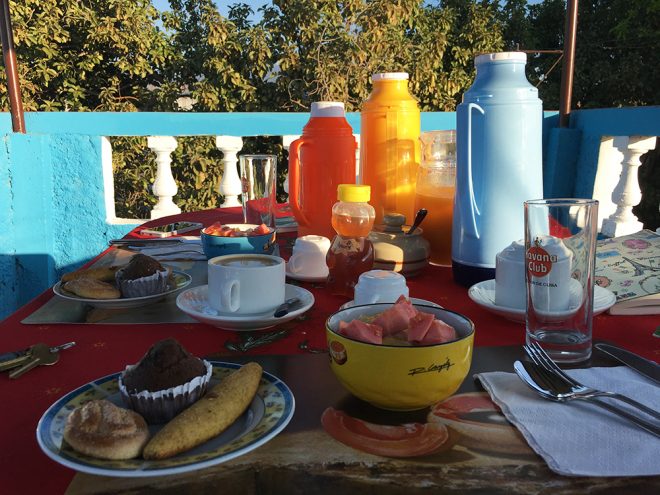
The hosts
We had great experiences with our hosts, apart from the one Casa we were supposed to stay at in Caibarién that completely forgot about our reservation. It was the most stressful part of our trip, it was night, we didn’t have a place to sleep, nor proper internet connection. In the end we didn’t even get our money back.
Apart from that one little incident, all our hosts were always helpful, giving us recommendations on where to eat, where to get money, what not to do, where we could find something specific that we were looking for and more. It was always so nice to talk to them about their culture and lives, what they (really) think about Fidel Castro, and how they see the “outside” world. This was probably the best part about staying at a Casa Particular in Cuba.
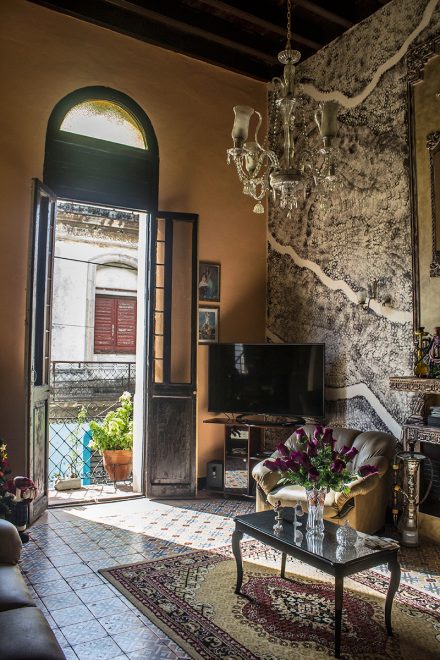
Other details and facts
♦ If you are planning on visiting the country during a busy season, such as Christmas and New Year’s Eve, try to book your accommodation as soon as possible, especially in popular locations such as Havana and Varadero.
♦ Even if you can’t find a Casa in a specific city online, be sure that you will fine one once you get there. Remember: in Cuba internet access is not for everyone, so there are several Casas that aren’t listed online. However, I do remember one of the hosts telling us that the government had plans to allow owners of Casas Particulares to have internet access from their homes to facilitate their business.
♦ Of course, it is possible to book Casas last minute once you’re there, but in this case you can’t be picky about it.
♦ The locals need to register their rooms with the government in order to host. They pay about 50CUCs per month for each room they rent, plus 10% of the income to the government. Apart from that, they are also responsible for paying for the water and electricity. Cuban life!
*Cuba is changing each day, so if you’ve been recently to the country and noticed some differences than what is stated here on this post, do let us know in the comments below so we can update the information.
Pin it up!
